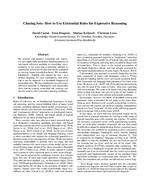Chasing Sets: How to Use Existential Rules for Expressive Reasoning
Aus International Center for Computational Logic
Chasing Sets: How to Use Existential Rules for Expressive Reasoning
David CarralDavid Carral, Irina DragosteIrina Dragoste, Markus KrötzschMarkus Krötzsch, Christian LeweChristian Lewe
David Carral, Irina Dragoste, Markus Krötzsch, Christian Lewe
Chasing Sets: How to Use Existential Rules for Expressive Reasoning
Proceedings of the 28th International Joint Conference on Artificial Intelligence (IJCAI'19), August 2019. International Joint Conferences on Artificial Intelligence
Chasing Sets: How to Use Existential Rules for Expressive Reasoning
Proceedings of the 28th International Joint Conference on Artificial Intelligence (IJCAI'19), August 2019. International Joint Conferences on Artificial Intelligence
- KurzfassungAbstract
We propose that modern existential rule reasoners can enable fully declarative implementations of rule-based inference methods in knowledge representation, in the sense that a particular calculus is captured by a fixed set of rules that can be evaluated on varying inputs (encoded as facts). We introduce Datalog(S) – Datalog with support for sets – as a surface language for such translations, and show that it can be captured in a decidable fragment of existential rules. We then implement several known inference methods in Datalog(S), and empirically show that an existing existential rule reasoner can thus be used to solve practical reasoning problems. - Bemerkung: Note: This is an extended version of the paper with an additional appendix.
- Projekt:Project: CPEC, DIAMOND
- Forschungsgruppe:Research Group: Wissensbasierte SystemeKnowledge-Based Systems
@inproceedings{CDKL2019,
author = {David Carral and Irina Dragoste and Markus Kr{\"{o}}tzsch and
Christian Lewe},
title = {Chasing Sets: How to Use Existential Rules for Expressive
Reasoning},
booktitle = {Proceedings of the 28th International Joint Conference on
Artificial Intelligence (IJCAI'19)},
publisher = {International Joint Conferences on Artificial Intelligence},
year = {2019},
month = {August}
}
